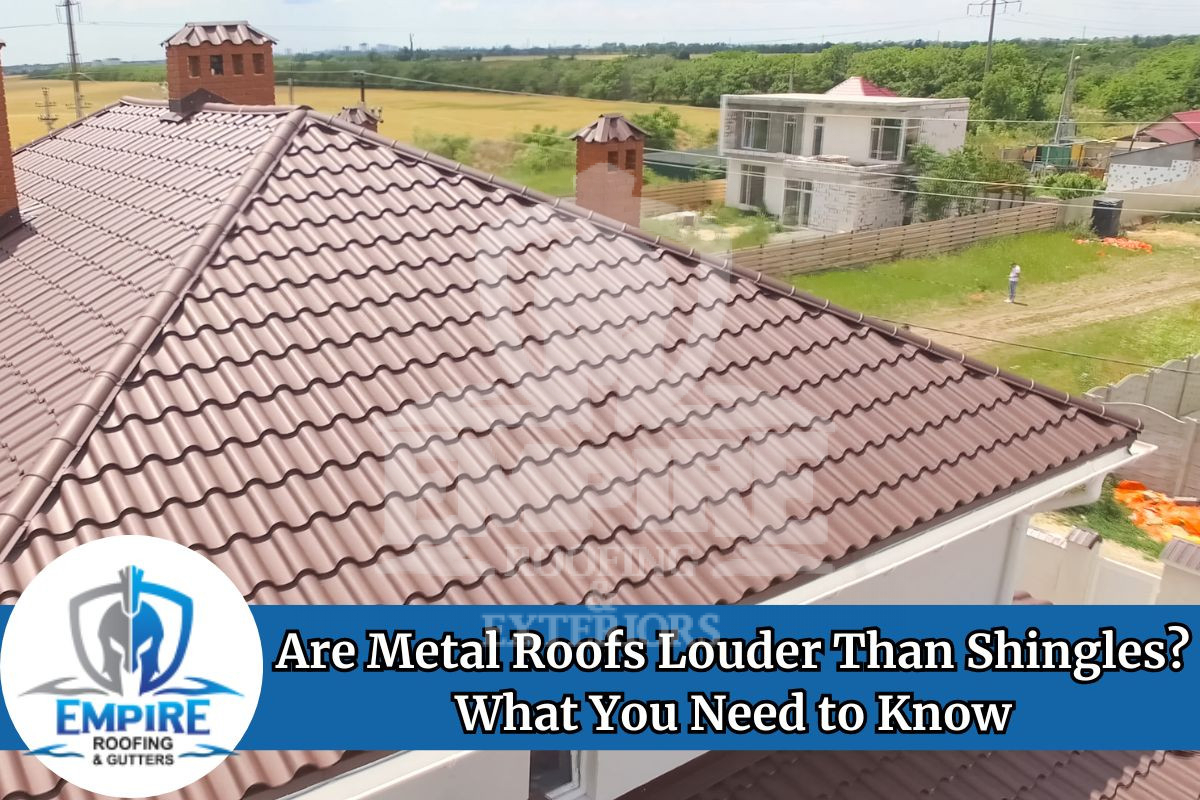Many homeowners worry that metal roofs will be too noisy, especially during heavy rain or hail. People often think metal roofs are much louder than asphalt shingles, which makes them hesitant to choose one for their home. However, modern roofing technology has reduced noise levels, making metal roofs quieter than most expect.
In this blog post, we’ll go over different aspects of metal and asphalt shingles to help answer the question: Are metal roofs louder than shingles?
What Causes Noise In Roofs?
For many homeowners, it can be concerning if the roof starts to make noise, especially as it ages. Over time, materials naturally wear down, leading to creaks and pops, which are often more noticeable during temperature changes. As the roof expands and contracts, these unexpected sounds can become more frequent. Trapped debris under shingles or issues with flashing can also cause popping or scraping noises, and in some cases, animals in the attic or moisture evaporating from the roofing materials may add to the noise.
How Sound Travels Through Roofing Materials
To reduce noise, roofing materials handle sound in two ways: airborne and impact transmission. Airborne sounds, like traffic or rain, travel through the air and pass through the roof, while impact sounds, like rain or hail, create vibrations.
A roof’s ability to block noise depends on its thickness, density, and insulation. Using thicker materials, special underlayments, and smart designs can improve soundproofing.
Noise Levels of Metal Roofs vs. Shingles
Now, let’s compare the noise levels of metal roofs and asphalt shingles to answer the question: Is a metal roof loud or not?

1. Decibel Levels
Metal roofs are usually louder than asphalt shingles during rain. A metal roof can reach 52 dBA, while asphalt shingles typically produce 46 dBA. A difference of around 6 dBA means metal roofs can be noticeably louder, especially during heavy rain or hail.
2. Material Composition and Thickness
The material type and thickness affect how sound travels. Thicker metal absorbs sound better than thinner ones and steel, being denser, reduces noise better than aluminum.
Since asphalt shingles have a layered structure, they naturally absorb sound, helping to make them more quiet on their own.
3. Installation Method
The installation method greatly affects a roof’s noise level. Metal roofs are quieter when installed over solid decking, as they absorb sound, compared to roofs that are installed over rafters. Having the proper fasteners also reduces noise in a metal roofing system.
Asphalt shingles help with soundproofing thanks to their layered design and surface granules, which absorb noise from rain, wind, and hail. Pairing them with quality underlayment further reduces noise, making them a great choice for homes.
4. Insulation and Soundproofing
Effective insulation is key for noise control, as it absorbs sound before it reaches the living space. While acoustic insulation greatly reduces noise in metal roofs, asphalt shingles naturally offer better soundproofing due to their density and layered structure. Adding extra insulation enhances this natural soundproofing, creating a quieter, more comfortable indoor environment.
Factors That Influence Metal Roof Noise
Next, let’s dive into the factors that can make a metal roof louder or quieter depending on installation and materials:
1. Type of Metal
The type of metal used for your roof plays a key role in noise levels. Thicker metals, like steel and aluminum, tend to absorb sound and create less noise. On the other hand, lighter metals like copper or zinc are more likely to amplify sound due to their thinner structure.
2. Roof Deck Material
The material beneath your metal roof also impacts noise. A solid deck made from plywood or OSB (oriented strand board) helps to dampen sound, while a lightweight deck may not absorb noise as effectively.
3. Underlayment
The underlayment you choose is crucial for noise reduction. Sound-dampening underlayment, when installed beneath metal roofs, can significantly reduce noise caused by rain, hail, or other impacts.
4. Panel Profile
The design of the metal panels themselves can affect acoustics. For example, standing seam panels, with their interlocking design, can reduce noise more effectively by minimizing vibrations compared to other panel profiles.
5. Roof Design and Slope
The angle and design of your roof can also influence noise levels. Steeper roofs tend to be quieter because they allow rain and debris to slide off more quickly, which reduces the time sound waves interact with the surface.
6. Installation Quality
Proper installation is key to keeping noise levels low. Poor installation or lack of insulation can amplify sound. Using soundproofing underlayment during installation can go a long way in reducing noise.
7. Fastener Type and Spacing
The type and spacing of fasteners used to secure the roof panels can also influence noise. If fasteners are too tight or improperly spaced, they can increase the noise.
8. Thermal Expansion
Metal roofs expand and contract with temperature changes, which can cause creaking or popping noises. Proper insulation and ventilation can help reduce this movement and minimize noise.
9. Insulation
Insulation doesn’t just control temperature; it also plays a critical role in reducing noise. Insulation helps absorb sound and block external noises from entering, making your roof quieter overall.
Upgrade To Your Metal Roof With Empire Roofing & Exteriors!
Are you in need of a durable, quiet, and stylish metal roof? Empire Roofing & Exteriors specializes in expert metal roof installation, using top-quality materials and techniques to reduce noise and improve the performance of your metal roof. We’ll help you choose the best type, underlayment, and insulation for a beautiful, peaceful home. Contact us today at (225) 347-8877 and experience the benefits of a professionally installed metal roof.
FAQ
A. Thicker metal roofs have more mass, helping absorb sound and reduce vibrations from rain or hail. Choosing high-quality materials further enhances noise reduction.
A. To reduce noise, use a soundproof underlayment like rubber or foam, which absorbs impact and blocks sound. While other options have benefits, dense materials provide the best noise reduction.
